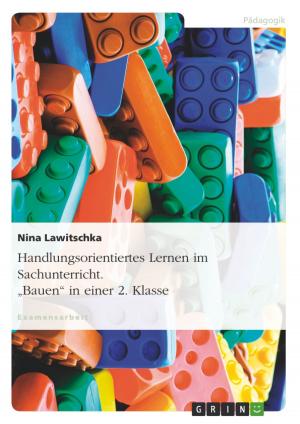GDR's national Identity in 'National Foundation' films: 'Die Abenteuer des Werner Holt' and 'Ich war neunzehn'
An investigation
Nonfiction, Entertainment, Performing Arts, Film| Author: | Richard McKenzie | ISBN: | 9783656003595 |
| Publisher: | GRIN Verlag | Publication: | September 9, 2011 |
| Imprint: | GRIN Verlag | Language: | English |
| Author: | Richard McKenzie |
| ISBN: | 9783656003595 |
| Publisher: | GRIN Verlag |
| Publication: | September 9, 2011 |
| Imprint: | GRIN Verlag |
| Language: | English |
Thesis (M.A.) from the year 2010 in the subject Communications - Movies and Television, grade: 'Merit', University of Reading (German Studies), course: MA (Res), language: English, abstract: This dissertation examines two DEFA films produced in the 1960's by Joachim Kunert and Konrad Wolf,who became part of East Germany's 2nd generation of filmmakers and who explored the causes of National Socialism and the remedies for the dreadful catastrophe that overcame Germany between 1933 and 1945. The collapse of the Reich in 1945 saw the end of the 12 year National Socialist reign of terror over Germany. The Nazi's had ensured that they had control of cultural life in Germany and had invested heavily in a film industry that created a national myth in order to support Nazi Party aims and which manipulated the public. The defeat of Germany saw the discrediting and failure of fascist, national identity, myth making, artistic stereotypes and the foundational films produced in Germany during the period 1933-45. By the 1960's DEFA, the GDR's state film production company had been exploring the origins of National Socialism for twenty years, starting with Wolfgang Staudte's Die Mörder sind unter uns, 1946, DEFA. The GDR's state film company, DEFA, was given the task of' [...]restor[ing] democracy in Germany and remove all traces of fascist and militaristic ideology from the minds of every German[...] (Allen, 1999,3). These films were produced to enable the Germans to have an 'honest confrontation with the military and moral catastrophe that [...]the Germans had brought on themselves[...]' (Barnouw,2008,48) and sought to 'develop a cinematic language[...]to confront the recent German past (Pinkert,2008,20). The 'grammar' of DEFA anti- fascist films was established by such films as Staudte, Die Mörder Sind Unter Uns orIrgendwo in Berlin, 1946, Gerhard Lamprecht, DEFA and Die Buntkarierten,1949, Kurt Maetzig, DEFA or Rotation,1949, Wolfgang Staudte,DEFA. These films were made by a generation that had grown up in the Weimar period and who had experienced the slide from Weimar chaos to National Socialist Dictatorship at first hand. The film makers were born in the late 19th or early 20th Centuries, Staudte in 1906, Lamprecht in 1897 and Maetzig in 1911. Their early films are an almost emotional expression of the moment of defeat containing heartfelt investigations of the causes of the catastrophe from within the Soviet Occupation Zone and later in the GDR. The 1950's saw DEFA turn its attention to films which explored the everyday concerns of GDR citizens struggling to build a new state centring on the Berlin films of the middle of that decade.
Thesis (M.A.) from the year 2010 in the subject Communications - Movies and Television, grade: 'Merit', University of Reading (German Studies), course: MA (Res), language: English, abstract: This dissertation examines two DEFA films produced in the 1960's by Joachim Kunert and Konrad Wolf,who became part of East Germany's 2nd generation of filmmakers and who explored the causes of National Socialism and the remedies for the dreadful catastrophe that overcame Germany between 1933 and 1945. The collapse of the Reich in 1945 saw the end of the 12 year National Socialist reign of terror over Germany. The Nazi's had ensured that they had control of cultural life in Germany and had invested heavily in a film industry that created a national myth in order to support Nazi Party aims and which manipulated the public. The defeat of Germany saw the discrediting and failure of fascist, national identity, myth making, artistic stereotypes and the foundational films produced in Germany during the period 1933-45. By the 1960's DEFA, the GDR's state film production company had been exploring the origins of National Socialism for twenty years, starting with Wolfgang Staudte's Die Mörder sind unter uns, 1946, DEFA. The GDR's state film company, DEFA, was given the task of' [...]restor[ing] democracy in Germany and remove all traces of fascist and militaristic ideology from the minds of every German[...] (Allen, 1999,3). These films were produced to enable the Germans to have an 'honest confrontation with the military and moral catastrophe that [...]the Germans had brought on themselves[...]' (Barnouw,2008,48) and sought to 'develop a cinematic language[...]to confront the recent German past (Pinkert,2008,20). The 'grammar' of DEFA anti- fascist films was established by such films as Staudte, Die Mörder Sind Unter Uns orIrgendwo in Berlin, 1946, Gerhard Lamprecht, DEFA and Die Buntkarierten,1949, Kurt Maetzig, DEFA or Rotation,1949, Wolfgang Staudte,DEFA. These films were made by a generation that had grown up in the Weimar period and who had experienced the slide from Weimar chaos to National Socialist Dictatorship at first hand. The film makers were born in the late 19th or early 20th Centuries, Staudte in 1906, Lamprecht in 1897 and Maetzig in 1911. Their early films are an almost emotional expression of the moment of defeat containing heartfelt investigations of the causes of the catastrophe from within the Soviet Occupation Zone and later in the GDR. The 1950's saw DEFA turn its attention to films which explored the everyday concerns of GDR citizens struggling to build a new state centring on the Berlin films of the middle of that decade.















